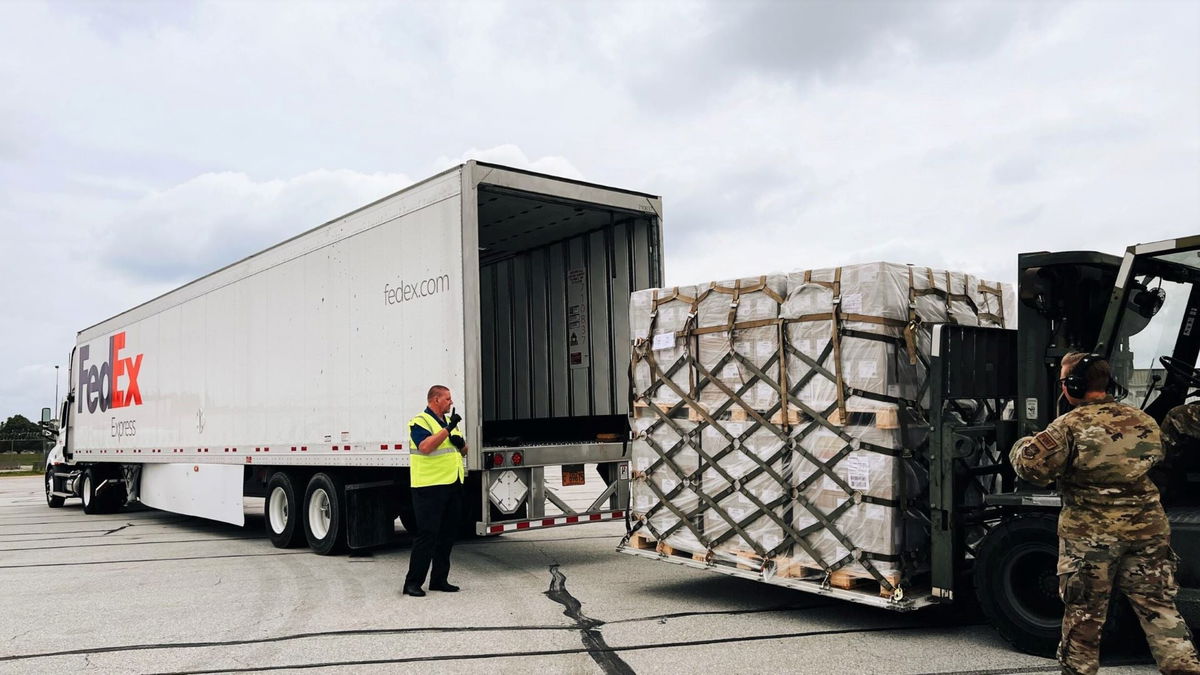A U.S. military aircraft arrived Sunday in Indianapolis with the first batch of baby formula from Europe under Operation Fly Formula as the Biden administration accelerates efforts to alleviate a domestic shortage.
The Air Force C-17 cargo jet transported 132 pallets of Nestle’s Alfamino Infant and Alfamino Junior formula from Ramstein Air Base in Germany to the Indianapolis airport. FedEx Express and FedEx Ground tractor trailers are hauling the 78,000-pound shipment, enough for more than 500,000 baby bottles, to a nearby Nestle Health Science distribution center, according to the White House and the express delivery company.
“Typically, the process to transport this product from Europe to U.S. would take two weeks. Thanks to Operation Fly Formula, we cut that down to approximately three days,” White House Press Secretary Karine Jean-Pierre told reporters on Air Force One as President Biden traveled to Japan from Korea. “This is a testament of the president’s commitment to pulling every lever to get more infant formula onto the market. And Operation Fly Formula is one tool that we are using to do so.”
The incoming formula will be inspected at the Nestle facility, as required for all food imports.
The supply shortfall has recently resulted in hospitalizations for some undernourished infants.
Agriculture Secretary Tom Vilsakc traveled to Indianapolis to greet the arrival of the first formula shipment. The Departments of Agriculture and Health and Human Services are working with manufacturers to identify available sources of overseas infant formula and placing transport requests with U.S. Transportation Command.

The Alfamino products were prioritized because they are specialty formula types – for babies allergic to cow’s milk – that are in critically short supply, according to the administration. Alfamino is primarily available through hospitals and home health care companies that serve patients at home. Brian Deese, director of the National Economic Council, said on CNN’s “State of the Union” program on Sunday that the C-17 flight is will carry about 15% of the needed amount of hypoallergenic formula and be available to families this week.
Administration officials said the initial shipment will provide enough formula for 9,000 at-risk babies and 18,000 toddlers for one week.
Administration officials had insisted since the launch of the emergency airlift on Wednesday that commercial cargo airlines selected by the Defense Department under existing contract arrangements would transport the baby formula. Officials said the following day that the initial round of flights would carry Nestle formula from Zurich to Indiana. Saturday’s statement said the urgency of the situation required the use of a military aircraft for the initial shipment.
The government plans to announce additional flights in the coming days. A shipment of Nestle’s Gerber Good Start Extensive HA is expected to arrive early this week.
The goal of the flights is to provide an emergency stopgap for specialty formulas that are in especially short supply and that many babies can’t substitute with other formulas because of special health needs.
Officials say airport destinations will be selected based on their proximity to manufacturers’ facilities.
Baby formula has been in short supply at retail stores over the past year because of widespread supply chain dislocations. The situation became acute in mid-February when Abbott Laboratories recalled products and shut down its largest formula plant in Sturgis, Michigan, over concerns about possible contamination after four infants became ill and two died.
Federal regulators have not found a direct connection between the bacteria that contaminated the formulas in the sick infants and the Sturgis plant, but have said it failed to comply with safety and quality practices.

The Food and Drug Administration this week gave Abbott Nutrition, the division that makes baby formula, permission to reopen the Sturgis facility if it takes remedial steps, such as hiring an independent expert to monitor compliance processes. Abbott says it can restart production within a couple of weeks after getting final approval, but that stores won’t receive shipments for another six to eight weeks.
(Story updated May 22 at 10:23 a.m. ET)
Click here for more FreightWaves/American Shipper stories by Eric Kulisch.
Related News:
US military arranges 1st flights of infant formula from Switzerland
How U.S. trade policy is making the baby formula shortage worse
